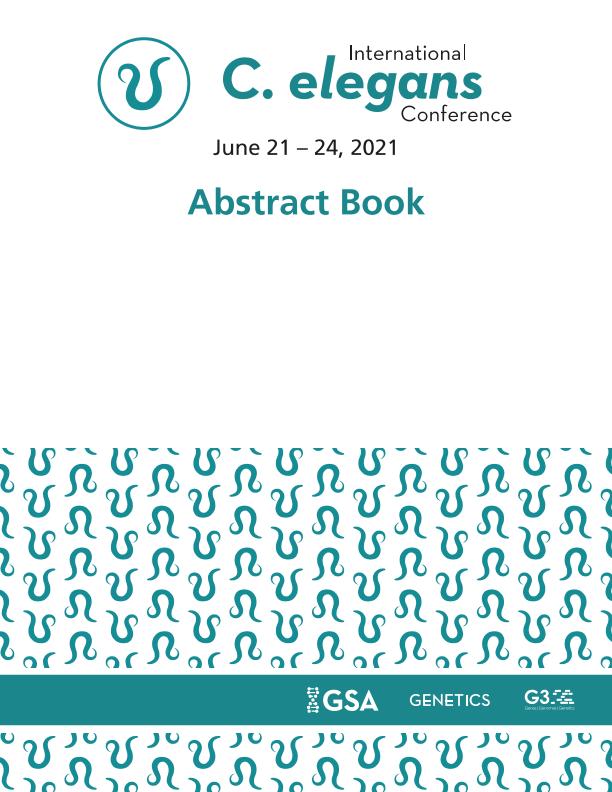Mostrar el registro sencillo del ítem
dc.contributor.author
Veuthey, Tania Vanesa

dc.contributor.author
Giunti, Sebastián

dc.contributor.author
Florman, Jeremy
dc.contributor.author
De Rosa, M.J.
dc.contributor.author
Alkema, Mark
dc.contributor.author
Rayes, Diego Hernán

dc.date.available
2023-10-24T18:47:29Z
dc.date.issued
2021
dc.identifier.citation
Tyramine modulates the systemic stress response by stimulating the release of intestinal insulin like-peptides (ILPs); 23rd International C. elegans Conference; Rockville; Estados Unidos; 2021; 442-442
dc.identifier.uri
http://hdl.handle.net/11336/215798
dc.description.abstract
Multicellular organisms trigger a complex and coordinated response against systemic stress. We have recently shown that in C. elegans, the neural stress-hormone tyramine supplies a state-dependent neural switch between acute flight- and longterm environmental-stress responses (De Rosa et al, 2019). Tyramine release during the flight response, stimulates the DAF-2/ Insulin/IGF-1 signaling (IIS) pathway and precludes the nuclear translocation of the DAF-16/FOXO transcription factor through the activation of an adrenergic-like receptor TYRA-3 in the intestine. We hypothesize that tyramine stimulates the release of agonist ILPs from the intestine which acts as an autocrine and/or paracrine signal to systemically activate the DAF-2/IIS pathway. To test this hypothesis we are screening ILPs mutants for their resistance to environmental stressors (oxidative and thermal stress). The C. elegans genome encodes 40 ILPs, 28 of which expressed in the intestine. We performed a screening of intestinal peptides described as strong DAF-2 agonist, by silencing individual intestinal ILPs and testing worm resistance to environmental stressors (oxidative and thermal stress). Thus, so far we found that ins-3 and ins-7 mutants are resistant to environmental stress, like tyramine-deficient and tyra-3 mutants. We are further testing whether tyramine directly stimulates the release of these ILPs from the intestine through a Gq-protein mediated signaling pathway. These studies will provide insight into how a neurohormone coordinates systemic cellular stress responses
dc.format
application/pdf
dc.language.iso
eng
dc.publisher
Genetics Society of America
dc.rights
info:eu-repo/semantics/openAccess
dc.rights.uri
https://creativecommons.org/licenses/by-nc-sa/2.5/ar/
dc.subject
flight response
dc.subject
stress
dc.subject
insulin
dc.subject
intestine
dc.subject.classification
Bioquímica y Biología Molecular

dc.subject.classification
Ciencias Biológicas

dc.subject.classification
CIENCIAS NATURALES Y EXACTAS

dc.title
Tyramine modulates the systemic stress response by stimulating the release of intestinal insulin like-peptides (ILPs)
dc.type
info:eu-repo/semantics/publishedVersion
dc.type
info:eu-repo/semantics/conferenceObject
dc.type
info:ar-repo/semantics/documento de conferencia
dc.date.updated
2023-06-01T10:09:15Z
dc.journal.pagination
442-442
dc.journal.pais
Estados Unidos

dc.journal.ciudad
Rockville
dc.description.fil
Fil: Veuthey, Tania Vanesa. Consejo Nacional de Investigaciones Científicas y Técnicas. Centro Científico Tecnológico Conicet - Bahía Blanca. Instituto de Investigaciones Bioquímicas de Bahía Blanca. Universidad Nacional del Sur. Instituto de Investigaciones Bioquímicas de Bahía Blanca; Argentina. Universidad Nacional del Sur. Departamento de Biología, Bioquímica y Farmacia; Argentina
dc.description.fil
Fil: Giunti, Sebastián. Consejo Nacional de Investigaciones Científicas y Técnicas. Centro Científico Tecnológico Conicet - Bahía Blanca. Instituto de Investigaciones Bioquímicas de Bahía Blanca. Universidad Nacional del Sur. Instituto de Investigaciones Bioquímicas de Bahía Blanca; Argentina. Universidad Nacional del Sur. Departamento de Biología, Bioquímica y Farmacia; Argentina
dc.description.fil
Fil: Florman, Jeremy. University Of Massachussets. Medical School. School Of Medicine. Departament Of Neurology; Estados Unidos
dc.description.fil
Fil: De Rosa, M.J.. Consejo Nacional de Investigaciones Científicas y Técnicas. Centro Científico Tecnológico Conicet - Bahía Blanca. Instituto de Investigaciones Bioquímicas de Bahía Blanca. Universidad Nacional del Sur. Instituto de Investigaciones Bioquímicas de Bahía Blanca; Argentina. Universidad Nacional del Sur. Departamento de Biología, Bioquímica y Farmacia; Argentina
dc.description.fil
Fil: Alkema, Mark. University Of Massachussets. Medical School. School Of Medicine. Departament Of Neurology; Estados Unidos
dc.description.fil
Fil: Rayes, Diego Hernán. Consejo Nacional de Investigaciones Científicas y Técnicas. Centro Científico Tecnológico Conicet - Bahía Blanca. Instituto de Investigaciones Bioquímicas de Bahía Blanca. Universidad Nacional del Sur. Instituto de Investigaciones Bioquímicas de Bahía Blanca; Argentina. Universidad Nacional del Sur. Departamento de Biología, Bioquímica y Farmacia; Argentina
dc.relation.alternativeid
info:eu-repo/semantics/altIdentifier/url/https://genetics-gsa.org/celegans-2021/
dc.conicet.rol
Autor

dc.conicet.rol
Autor

dc.conicet.rol
Autor

dc.conicet.rol
Autor

dc.conicet.rol
Autor

dc.conicet.rol
Autor

dc.coverage
Internacional
dc.type.subtype
Congreso
dc.description.nombreEvento
23rd International C. elegans Conference
dc.date.evento
2021-06-21
dc.description.ciudadEvento
Rockville
dc.description.paisEvento
Estados Unidos

dc.type.publicacion
Book
dc.description.institucionOrganizadora
Genetics Society of America
dc.source.libro
23rd International C. elegans Conference: Abstract Book
dc.date.eventoHasta
2021-06-24
dc.type
Congreso
Archivos asociados
